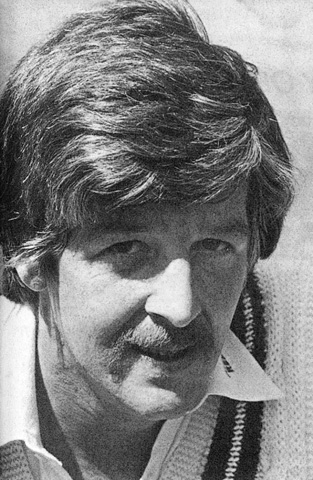 Dermott Monteith's honours-laden sports career as an international cricketer is at an end — that sad fact is being conceded with heavy heart by his friends and not being disputed by the great man himself. Though Ireland's most prolific wicket-taker of all time has made a typically courageous and medically remarkable recovery from horrendous injuries sustained in a hit-and-run accident near his Bangor home early last year, athletically he will never be quite the same again. So he'll never add to his tally of 76 caps.
Dermott Monteith's honours-laden sports career as an international cricketer is at an end — that sad fact is being conceded with heavy heart by his friends and not being disputed by the great man himself. Though Ireland's most prolific wicket-taker of all time has made a typically courageous and medically remarkable recovery from horrendous injuries sustained in a hit-and-run accident near his Bangor home early last year, athletically he will never be quite the same again. So he'll never add to his tally of 76 caps.
The demanding schedule of international sport is clearly beyond him, unfortunately; but the news is not all bad. Forty-three-year-old Monteith will almost certainly come back to some kind of action. He could play for his Lisburn club and even in exhibition matches; and, indeed, beckoning are legislative roles with an ideal development being election as a selector and/or appointment as Ireland team-manager. No better man for such jobs!
Indications that he could play cricket of a minor nature represents welcome news. A season without the blustering presence of Dermott at the wicket, whether batting belligerently, bowling artfully and accurately, or simply marshalling his forces as captain would be empty indeed for those of us who over the past 30 years or so have grown accustomed to his ways and moods and brilliant performances. Is it any wonder, indeed, that with Dermott sidelined, it rained for most of last summer; apparently even the elements mourning the absence of a superstar — a competitor who could be said to have brought as much honour and distinction to Ireland as did leading players in other sports.
From an early stage Monteith had the possibilities of greatness. He took up the game when only five; two years later he was with Lisburn and was playing top cricket by the time he reached 15.
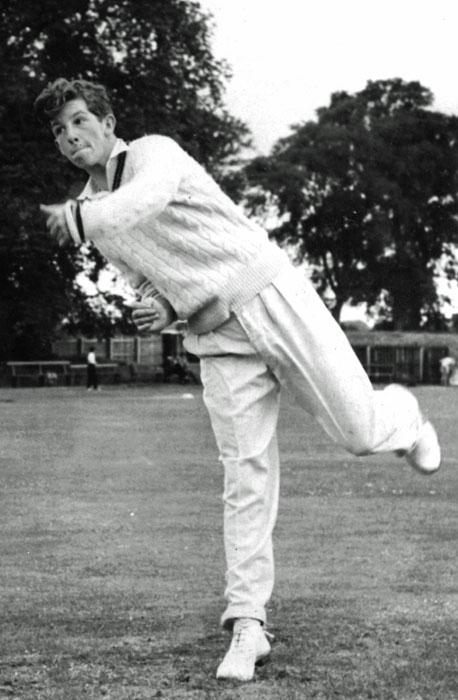 A young Monteith practicising at Lisburn
A young Monteith practicising at Lisburn
Chosen on the NCU XI to oppose the North West in 1962, Dermott was only a year out of school. Look at the remainder of that NCU side: John Law, Sonny Hool, Given Lyness, Ken Kirkpatrick, Archie McQuilken, Tom McCloy, Len Spearman, Carson Rose, Herbie Martin and Noel Ferguson — all but three full internationals. If Dermot felt like a novice among such distinguished company, he was to learn quickly.
His appointment as Irish captain for the first time in 1976 caused eyebrows to be raised. To many, Dermott was as improbable a captain as was Ian Botham of England's Test team. Unlike the Somerset star, though, Monteith made good — and right away too. Not only did his game thrive on the extra problems, cares and responsibilities but in the very area of leadership that had occasioned most of the doubt he confounded critics with analytical appraisal of tricky situations and, in particular, by the manner in which he extracted the very best from all of his team-mates.
Most certainly he was an adventurous captain. I still shudderingly recall his controversial decision to bat first against Middlesex in the Gillette Cup at Lord's in 1979.
'Is the man mad?' exclaimed one hot-under-the-collar enthusiast who had taken a few days off work and travelled to London especially to see Ireland in action on their debut in the 60-overs competition.
'Dermott's decision not to ask the opposition to bat first could well mean the match will be over by lunch,' wailed another supporter that damp and depressing morning.
Even if the sun never showed its face what followed amounted to one of the brightest days in Irish cricket. Mighty Middlesex died several deaths through embarrassment before eventually clawing their way out of their predicament. Monteith still insists that had a couple of chances not been put down Ireland would have scored a famous victory.
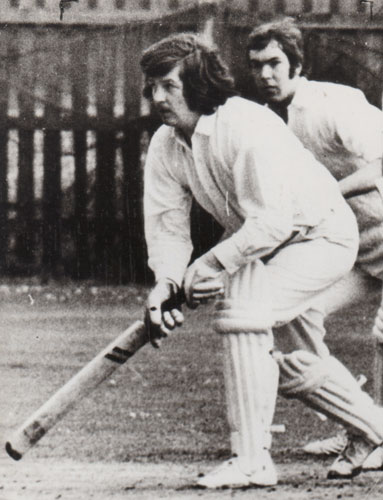 Batting for Lisburn at Wallace Park
Batting for Lisburn at Wallace Park
Monteith's inspirational impact on the side made him a winning captain, the most successful Ireland has had. In his first full season in command, in 1978, the team were unbeaten in five matches, wins being notched against Denmark and Wales, and Surrey being forced to follow on at Rathmines in one of the three drawn fixtures.
Victory over Scotland at Downpatrick in 1983 gave Dermott his record ninth win at the helm. His confidence had players believing in themselves. For their part, they combined well as a unit, always putting the cause of the team well above personal considerations. It was a great time to be a member of the Irish camp.
Monteith himself had the happy knack of producing top form in pressure situations. On his very first day as captain, in that Downpatrick match against Holland, he came to the middle with Ireland reeling at 65 for six and scored a match-turning 52 before being last out.
Against the 1976 West Indies at Rathmines, he claimed the prized wickets of Gordon Greenidge and Viv Richards (caught in slips by Gerry O'Brien for one!) and for good measure added those of Larry Gomes, Bernard Julien and Michael Findlay to his collection. And all for fewer than 100 runs in 24 overs! There is no bowler in the world who would not envy figures of that kind against that calibre of opposition.
Rick McCosker, David Hookes, Kim Hughes, Rodney Marsh, Gary Cosier and Len Pascoe were six Australians he dismissed for 97 runs in 21 overs at Rathmines the following year. The best batsmen around fell prey to his brilliant left-arm control of length, line and flight.
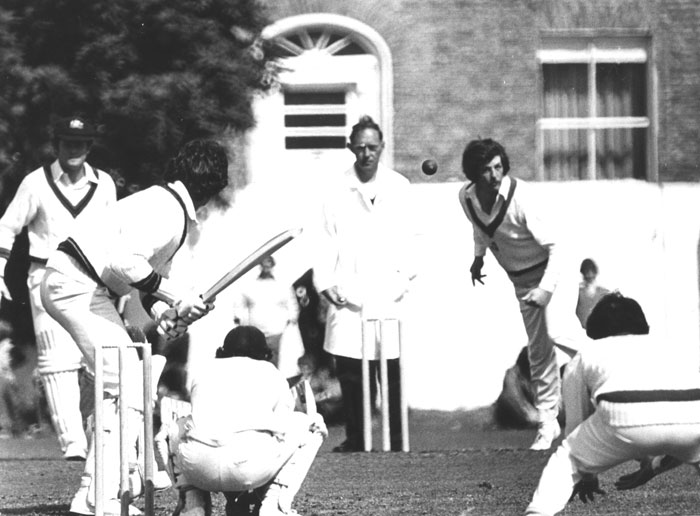 Bowling against Australia at Rathmines in 1977
Bowling against Australia at Rathmines in 1977
Yet it had been as a batsman that he made his debut for Ireland at Lord's in 1965, being an instant success with a cavalier 54 (eight fours and a six). There were other exhilarating contributions with the bat. Arguably his finest knock for Ireland came in the near-successful chase of 276 against Gloucestershire at Bristol in 1983.
All seemed well lost at 209 for eight, when Dermott chose his moment to make his highest score at international level. Ably assisted by Michael Halliday, Monteith brought Ireland to the brink of what would have been only their second success ever over county opposition and his own score to 91 when dismissed by a fine mid-wicket catch.
The summer of 1971 yielded a record 47 wickets in five matches. On his 41st birthday and in his 71st international, Monteith claimed four MCC first-innings wickets at Ormeau in 1984 to become the top wicket-taker for all time for Ireland. He drew level with Jimmy Boucher's longstanding high-water mark of 307 wickets by having Rodney Cass caught by Ivan Anderson and then moved clear on his own by luring Sam Mehar into giving a slip catch to Robert Wills.
Such a wizard with the ball was he, that I used sometimes to think, were he to concentrate on it, that he could devise a delivery that would break both ways at once and so put his name for all time into the history of the game.
In dealing with people Monteith could be abrasive. For sure, he never suffered fools gladly. Yet the outpourings of sympathy for him and his family on his serious accident are indicative of the high esteem in which he is held by cricketers from all parts of the country and abroad as well. Flowers and get-well cards poured in from every quarter. MCC, for whom he even toured abroad, the NCA, Middlesex remembered an old friend who had served them all well on the field of play.
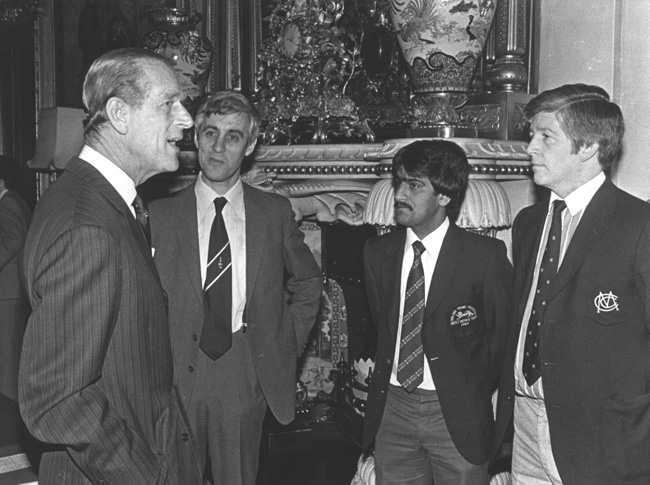 Meeting the Duke of Edinburgh at Buckingham Palace with the winning Mddlesex County Championship side of 1981
Meeting the Duke of Edinburgh at Buckingham Palace with the winning Mddlesex County Championship side of 1981
'He is a most intelligent man, pleasant and yet hard when he feels he has to exercise his authority. He knows when to put the pressure on and is a very positive captain. He never stops thinking about new ploys on the field,'' was Dermot's assessment of Mike Brearley under whom he played at Middlesex. No better assessment could be written about the Ulster man's own career.
Statistical postscript: Monteith played in 76 matches, bowled in 126 innings, batted himself 99 times. 886 of 2414.1 overs were maidens and his 326 wickets cost 5664 runs for an average of 17.37. He scored 1712 runs, top score 95, for an average of 20.62.
